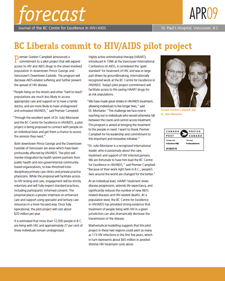BC Liberals commit to HIV/AIDS pilot project
Premier Gordon Campbell announced a commitment to a pilot project that will expand access to HIV and AIDS drugs to the street-involved population in downtown Prince George and Vancouver’s Downtown Eastside. The program will decrease AIDS-related suffering and further prevent the spread of HIV disease.
“People living on the streets and other ‘hard to reach’ populations are much less likely to access appropriate care and support or to have a family doctor, and are more likely to have undiagnosed and untreated HIV/AIDS,” said Premier Campbell.
“Through the excellent work of Dr. Julio Montaner and the BC Centre for Excellence in HIV/AIDS, a pilot project is being proposed to connect with people on an individual basis and get them a chance to access the services they need.”
Both downtown Prince George and the Downtown Eastside of Vancouver are areas which have been profoundly affected by HIV/AIDS. The pilot will involve integration by health system partners from public health and non-governmental community-based organizations, to low-threshold interdisciplinary primary care clinics and private practice physicians. While the proposal will facilitate access to HIV testing and care, engagement will be strictly voluntary and will fully respect standard practices, including participants’ informed consent. The proposal places a greater emphasis on enhanced care and support using specialist and tertiary care resources in a more focused way. Once fully operational, the pilot project will cost about $20 million per year.
It is estimated that more than 12,000 people in B.C. are living with HIV, and approximately 27 per cent of these individuals remain undiagnosed. Highly active antiretroviral therapy (HAART), introduced in 1996 at the Vancouver International Conference on AIDS, is considered the ‘gold standard’ for treatment of HIV, and was in large part driven by groundbreaking, internationally recognized work at the BC Centre for Excellence in HIV/AIDS. Today’s pilot project commitment will facilitate access to life-saving HAART drugs for at-risk populations.
“We have made great strides in HIV/AIDS treatment, allowing individuals to live longer lives,” said Dr. Montaner. “The challenge we face now is reaching out to individuals who would otherwise fall between the cracks and cannot access treatment. This program is aimed at bringing the treatment to the people in need. I want to thank Premier Campbell for his leadership and commitment to this important and innovative initiative.”
“Dr. Julio Montaner is a recognized international leader, who is passionate about the care, treatment and support of HIV infected persons. We are fortunate to have him lead the BC Centre for Excellence in HIV/AIDS,” said Premier Campbell. “Because of their work right here in B.C., people’s lives around the world are changed for the better.”
At an individual level, HAART treatment slows disease progression, extends life expectancy, and significantly reduces the number of new AIDS-related diseases and HIV-related deaths. At a population level, the BC Centre for Excellence in HIV/AIDS has provided strong evidence that treatment of people living with HIV in a given jurisdiction can also dramatically decrease the transmission of the disease.
Mathematical modelling suggests that this pilot project in these two regions could avert as many as 173 HIV infections in the first five years, which in turn represents about $65 million in avoided lifetime HIV treatment costs alone.

